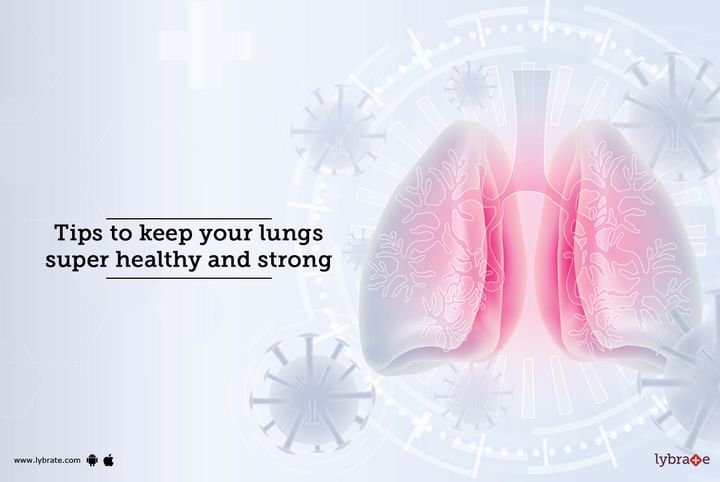9 Tips To Keep Your Lungs Strong And Healthy
We occasionally take our lungs for granted. They keep us healthy and well, and we don't have to ponder about them much. This is why it is critical and advised to prioritize your lung health.
Our body has a built-in defensive mechanism intended to keep dirt and bacteria out of your lungs. However, there are several critical steps you may take to reduce your chance of lung illness. Scroll down and look at some useful tips to take care of your lungs in a better and healthier way.
Count your breaths -
You may also improve your lung capacity by lengthening your inhalations and exhalations. Begin by timing how long it takes you to take a normal breath. If you inhale to the counting of five, you should exhale to the count of five as well. Attempt to maintain them all the same length.
After you've determined your average breath count, add one extra count to each inhale and exhale until you're able to effectively lengthen the time it takes to fill and deplete your lungs.
The goal is to prevent straining or producing discomfort; the transition should be gradual and comfortable. This is especially essential for lung disorders, which may not show visible signs until they are advanced. Reach out to your doctor if you notice any changes in your regular breathing pattern. They'll hear your lungs and perhaps do tests to figure out what's wrong.
Keep yourself hydrated -
Water is just as necessary for the lungs as it is for the body's other organs. Staying hydrated by drinking plenty of fluids on a regular basis aids in keeping the mucosal linings of the lungs thin. This thinner lining improves lung function.
Quit smoking -
Smoking is the leading cause of lung illness and significantly contributes to COPD or lung disease. Tobacco smoking promotes chronic inflammation in the lungs, making breathing more challenging and destroying lung tissue. Don't start smoking if you're not a smoker.
Breath clean air -
Secondhand smoking, radon, and automobile exhaust are all examples of both indoor and outdoor air contaminants that can cause or aggravate lung issues. Take precautions to ensure that you and your families are breathing in as much clean air as possible, such as checking your house for radon on a regular basis and going on walks away from busy highways that expose you to high levels of car exhaust.
Play a wind instrument -
To improve your lung health, you can play a wind instrument such as a flute, oboe, tuba, saxophone, mouth organ, or clarinet. To perform any of these instruments, you must maximize your lung capacity. This provides a regular workout for your lungs and helps to strengthen their air capacity.
The body has a built-in defensive system to safeguard the lungs. Most of the time, this works quite effectively at keeping dirt out and pathogens at bay. However, various toxic chemicals can alter the airways and jeopardize the lungs' capacity to function normally, leading to lung disease.
Asthma, chronic obstructive pulmonary disease, bronchitis, pneumonia, emphysema, cystic fibrosis, TB, lung cancer, and acute respiratory distress syndrome are some prevalent lung illnesses. People suffering from lung illness have trouble breathing, and some disorders can result in respiratory failure.
Laughter therapy -
Laughter causes lengthier exhalations, releasing remaining air from the lungs and replenishing the blood with oxygen. As one breathes deeply during a hearty chuckle, the lungs are filled with oxygenated blood, and you may cough, splutter, or spit phlegm owing to mucus loosening in your respiratory system as well as a thorough cleansing.
Diaphragmatic breathing -
Diaphragmatic breathing, often known as deep breathing, is a kind of breathing that is accomplished by compressing the diaphragm, a muscle placed laterally between the thoracic and abdominal cavities. With this form of breathing, air enters the lungs, causing the chest to expand and the belly to rise. Diaphragmatic breathing can be employed by persons with lung disorders such as asthma, emphysema, and chronic bronchitis, as well as healthy people. It suggests that concentrating on dropping the diaphragm when inhaling permits a person to take a deeper breath, which is a method utilized by professional singers to boost lung capacity.
Stay Active -
To keep your lungs healthy, you must exercise to keep your muscles in order to maintain them healthy and powerful. Regular everyday activities and workouts will not push your lungs as severely as they ought to. Pick up indoor/ outdoor or any other physical activities that raises your heart rate and causes you to breathe more deeply.
Regular physical activities build up your lungs, enhance lung capacity, and aid in lung cleaning.
Keep your hands clean -
Like a cold, an airway infection may enter your lungs and create major health complications related to respiratory tracts. Washing your hands frequently with hand wash and water will help protect you from several infections and diseases and keep germs at bay. You should also clean your teeth twice a day and visit your hygienist at least 2 times a year. Make doubly sure you get your flu shot every year. Once flu enters your respiratory tract and infects it, it may infect you with various diseases such as chronic pulmonary fibrosis, lung cancer and pneumonia etc.



+1.svg)
